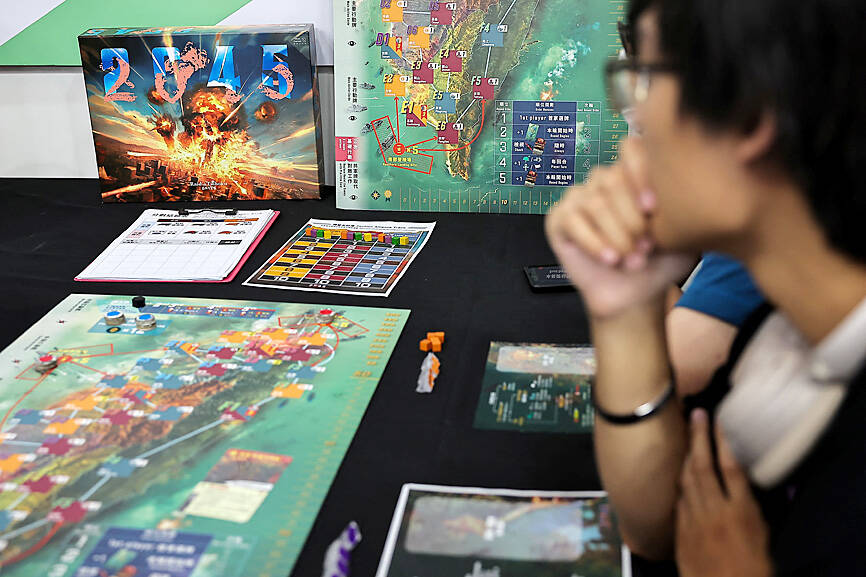A new board game set against the backdrop of armed conflict around Taiwan is to be released next month, amid renewed threats from Beijing, inviting players to participate in an imaginary Chinese invasion 20 years from now.
China has ramped up military activity close to Taiwan in the past few years, including massing naval forces around the nation.
The game, titled 2045, tasks players with navigating the troubles of war using colorful action cards and role-playing as characters involved in operations 10 days before a fictional Chinese invasion of Taiwan.

Photo: Ann Wang, Reuters
That includes members of the armed forces, Chinese sleeper agents and pro-China politicians working to sabotage the Taiwan’s defense, as well as citizens picking up guns to defend their homeland.
Taiwanese board game maker Mizo Games started crowdfunding the game in August. Within two-and-a-half months, the company had received more than NT$4 million (US$122,261) to fund the project.
“It is not quite peaceful around Taiwan and the Western Pacific as we speak,” Mizo Games founder Chang Shao-lian (張少濂) said.
Chang said he wanted “players to feel they want to win and think about what they will do to win.”
The game, which is also to go on sale in the US and Europe later in the year, has been developed at a time when officials have intensified preparations for scenarios, including a China conflict.
Players who participated in a play test of 2045 said they learned about what might happen in the event of a Chinese invasion and that they hoped the game could help people understand the implications of a war.
“I am not very knowledgeable on military matters, therefore through this game I learned about where the army may land and launch an attack,” said Kalin Lai, a 23-year-old who tried out the game.
Mizo Games has created two other Taiwan war-themed board games — one about surviving an air raid in Taipei and the other about a bombing in Kaohsiung during Japan’s colonization of the nation between 1895 and 1945.

POSITIVE DEVELOPMENT: Japan and the US are expected to hold in-depth discussions on Taiwan-related issues during the meeting next month, Japanese sources said The holding of a Japan-US leaders’ meeting ahead of US President Donald Trump’s visit to China is positive news for Taiwan, former Japan-Taiwan Exchange Association representative Hiroyasu Izumi said yesterday. After the Liberal Democratic Party’s landslide victory in Japan’s House of Representatives election, Japanese Prime Minister Sanae Takaichi is scheduled to visit the US next month, where she is to meet with Trump ahead of the US president’s planned visit to China from March 31 to April 2 for a meeting with Chinese President Xi Jinping (習近平). Japan and the US are expected to hold in-depth discussions on Taiwan-related issues during the

‘LIKE-MINDED PARTNER’: Tako van Popta said it would be inappropriate to delay signing the deal with Taiwan because of China, adding he would promote the issue Canadian senators have stressed Taiwan’s importance for international trade and expressed enthusiasm for ensuring the Taiwan-Canada trade cooperation framework agreement is implemented this year. Representative to Canada Harry Tseng (曾厚仁) in an interview with the Central News Agency (CNA) said he was increasingly uneasy about Ottawa’s delays in signing the agreement, especially as Ottawa has warmed toward Beijing. There are “no negotiations left. Not only [is it] initialed, we have three versions of the text ready: English, French and Mandarin,” Tseng said. “That tells you how close we are to the final signature.” Tseng said that he hoped Canadian Prime Minister Mark Carney

President William Lai (賴清德) yesterday bestowed one of Taiwan’s highest honors on Saint Vincent and the Grenadines (SVG) Ambassador Andrea Clare Bowman in recognition of her contributions to bilateral ties. “By conferring the Order of Brilliant Star with Grand Cordon on Ambassador Bowman today, I want to sincerely thank her, on behalf of the Taiwanese people, for her outstanding contribution to deepening diplomatic ties between Taiwan and SVG,” Lai said at a ceremony held at the Presidential Office in Taipei. He noted that Bowman became SVG’s first ambassador to Taiwan in 2019 and

A man walks past elementary school artworks at the Taipei Lantern Festival in Ximen District yesterday, the first day of the event. The festival is to run from 5pm to 10pm through March 15.